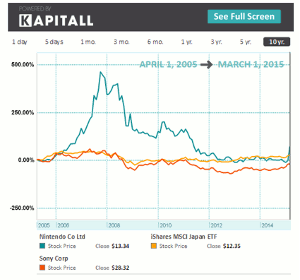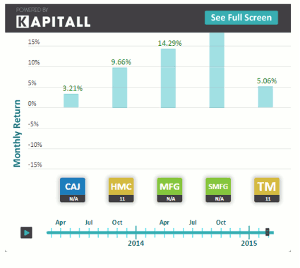Chris Lau, of Kapitall.com, discusses Abenomics and highlights how Japan’s stock market is rising, having passed a key level for the first time in 15 years. Chris also points out that as the US dollar strengthens against the Japanese yen, it may not be too late to consider investing in Japan.
Abenomics has its detractors, but with the Nikkei above 19,000, investors are eyeing Japan.
Japan’s stock market is roaring back. For the first time in 15 years, the Nikkei index has passed 19,000. The macro environment is clearly helping buoy the region. As the US dollar strengthens against the weakening yen, it might not be too late for investors to consider investing in Japan.
Why the Nikkei Is Up
Prime Minister Shinzo Abe has implemented an economic reform plan, popularly known as "Abenomics," that is paying off for the stock market. His policy in boosting government spending and raising consumption tax brought the yen's value down, which helped to make Japan's exports more attractive abroad.
Investors eager for exposure to Japan's entertainment and gaming sector might buy Sony (SNE) or Nintendo (NTDOY). Both firms are struggling, but Sony has implemented drastic cuts in its entertainment division. The market has responded positively and the stock is now up over 50% in the last year. In the past week, Sony has announced that it would lower R&D spending and will adopt longer smartphone release cycles. The move could mean better operating margin and sustainable profitability.
Nintendo, on the other hand, is a contrarian play. The firm’s latest console is not much of a hit, but its handheld, the 3DS, sold well in America. In February, the 3DS was the best-selling console in the US last month in February. If there is a renaissance in demand for the Wii, Nintendo’s shares could rebound.
Another way investors can gain exposure to Japan is through the iShares MCSI Japan ETF (EWJ).
Bottom Line
Buying an index as it reaches new yearly highs has risks. The market momentum may reverse as investors take profits. Conservative investors might want to add the Japan ETF to their watch list for now.
Below are the top 5 US-traded holdings in the iShares MSCI Japan ETF. Click on the interactive chart to view data over time.
1. Canon Inc. (CAJ): Canon, Inc., through its subsidiaries, manufactures and sells network digital multifunction devices (MFDs), plain paper copying machines, laser printers, inkjet printers, cameras, and lithography equipments primarily under Canon brand in the Americas, Europe, Asia, and Oceania. Market cap at $44.06B, most recent closing price at $33.01.
Canon is EWJ’s 10th largest holding, at 1.28% and 6,208,950 shares.
2. Honda Motor Co. Ltd. (HMC): Engages in the development, manufacture, and distribution of motorcycles, automobiles, and power products primarily in North America, Europe, and Asia. Market cap at $62.35B, most recent closing price at $34.43.
Honda is EWJ’s 3rd largest holding, at 1.91% and 8,992,200 shares.
3. Mizuho Financial Group Inc. (MFG): Provides various banking and financial services in Japan and internationally. Market cap at $45.45B, most recent closing price at $3.73.
Mizuho is EWJ’s 7th largest holding, at 1.42% and 124,392,180 shares.
4. Sumitomo Mistui Financial Group Inc. (SMFG): Provides various banking and financial products and services in Asia and the Oceania, the Americas, Europe, the Middle East, and Africa. Market cap at $56.86B, most recent closing price at $8.11.
Sumitomo Mitsui is EWJ’s 5th largest holding, at 1.74% and 7,065,300 shares.
5. Toyota Motor Corporation (TM): Engages in the design, manufacture, assembly, and sale of passenger cars, minivans, and commercial vehicles. Market cap at $235.01B, most recent closing price at $137.52.
Toyota is EWJ’s largest holding, at 6.46% and 35,500 shares.
By Chris Lau of Kapitall.com













